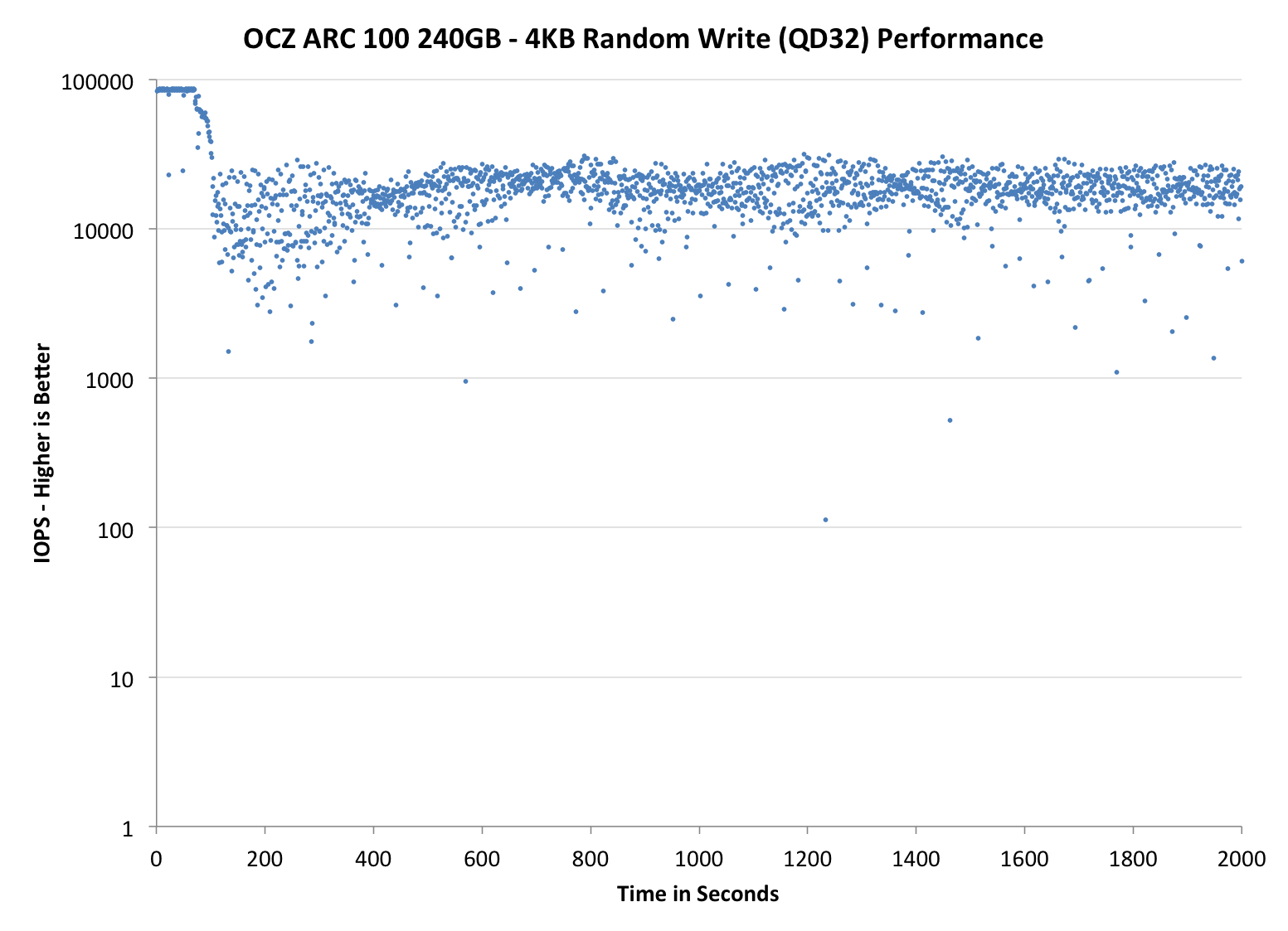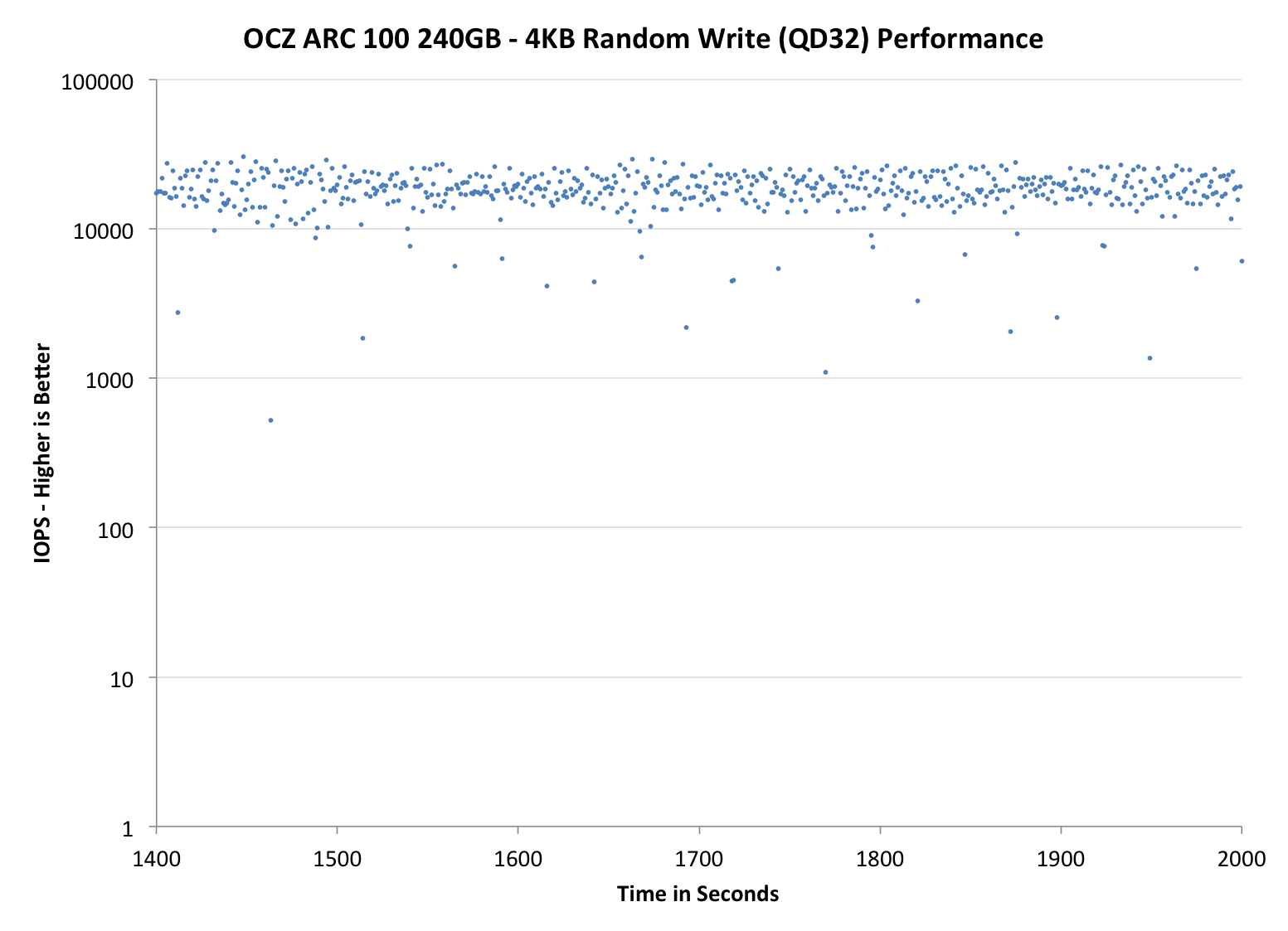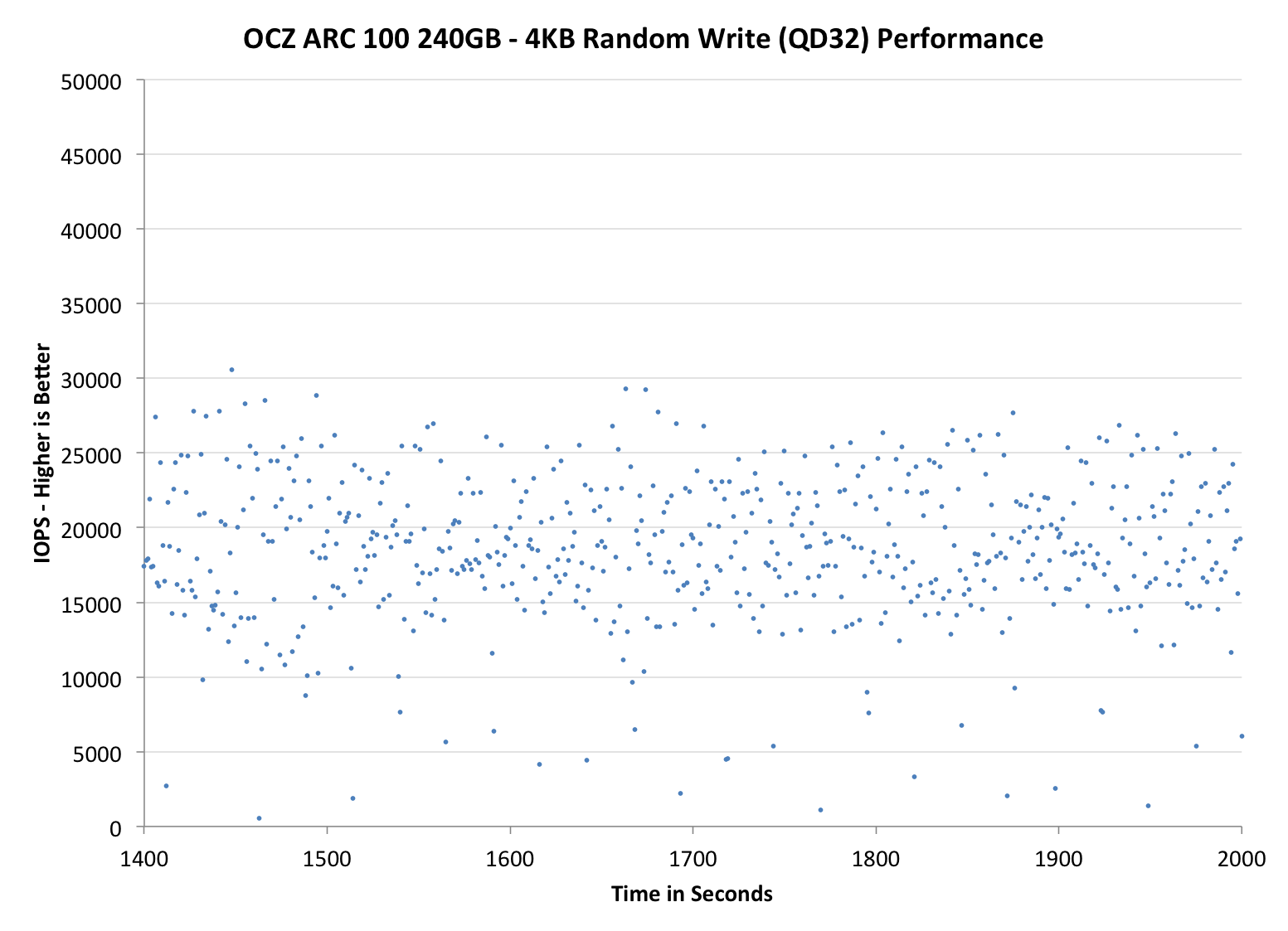OCZ ARC 100 (240GB) SSD Review
by Kristian Vättö on August 26, 2014 7:00 AM ESTPerformance Consistency
Performance consistency tells us a lot about the architecture of these SSDs and how they handle internal defragmentation. The reason we do not have consistent IO latency with SSDs is because inevitably all controllers have to do some amount of defragmentation or garbage collection in order to continue operating at high speeds. When and how an SSD decides to run its defrag or cleanup routines directly impacts the user experience as inconsistent performance results in application slowdowns.
To test IO consistency, we fill a secure erased SSD with sequential data to ensure that all user accessible LBAs have data associated with them. Next we kick off a 4KB random write workload across all LBAs at a queue depth of 32 using incompressible data. The test is run for just over half an hour and we record instantaneous IOPS every second.
We are also testing drives with added over-provisioning by limiting the LBA range. This gives us a look into the drive’s behavior with varying levels of empty space, which is frankly a more realistic approach for client workloads.
Each of the three graphs has its own purpose. The first one is of the whole duration of the test in log scale. The second and third one zoom into the beginning of steady-state operation (t=1400s) but on different scales: the second one uses log scale for easy comparison whereas the third one uses linear scale for better visualization of differences between drives. Click the dropdown selections below each graph to switch the source data.
For more detailed description of the test and why performance consistency matters, read our original Intel SSD DC S3700 article.
 |
|||||||||
| Default | |||||||||
| 25% Over-Provisioning | |||||||||
The performance consistency takes a small hit compared to the Vector 150 and Vertex 460, but compared to the other value drives the ARC 100 offers amazing consistency. Most of the performance gain is due to the higher default over-provisioning (12% vs 7% in other value SSDs), although the Barefoot 3 platform has always done well when it comes to consistency. While there is quite a bit of variation in IOPS, the average is still somewhere between 15K and 20K IOPS, whereas for example the MX100 only provides about 5K IOPS at steady-state.
 |
|||||||||
| Default | |||||||||
| 25% Over-Provisioning | |||||||||
 |
|||||||||
| Default | |||||||||
| 25% Over-Provisioning |
|
||||||||










54 Comments
View All Comments
mapesdhs - Wednesday, August 27, 2014 - link
So when Intel had its 8MB bricked-SSD problem, why weren't they villified by everyone andhence all trust lost?
The concept of trust for a technical product is bizarre. Either it works within a set range of
specs & requirements, or it doesn't. OCZ makes a bunch of models that work very well
indeed (Vertex4, Vector, etc.), yet people act and post comments as if that's not true,
which is just dumb IMO.
Ian.
hojnikb - Wednesday, August 27, 2014 - link
Not to mention all the issues sandforce based drives had.LB-ID - Tuesday, August 26, 2014 - link
(checks the manufacturer)Yup, still OCZ. If I want to be a beta-tester for an unreliable and unscrupulous company, I'd go volunteer to be a guinea pig for someone contracting for the NSA. No thank you, never again.
Caveat emptor.
mapesdhs - Wednesday, August 27, 2014 - link
QED, more pointless FUD.Ian.
jsntech - Tuesday, August 26, 2014 - link
There are probably 'good' reasons for it, but I really chuckle every time I think about Toshiba buying a brand name with a history of unreliable products and bad customer support, and then rebranding brand new tech with that tainted name.For the love of pete, why why why?
Oh well. Best of luck to Toshiba, but I personally will never again buy anything on earth with 'OCZ' in the name.
kyuu - Wednesday, August 27, 2014 - link
This logic is silly. You explicitly acknowledge that it is merely the same label on what is largely a different company, but you refuse to buy anything with the label because... reasons?Granted, it was a poor choice by Toshiba to keep the OCZ branding, but I wager Toshiba management was unaware of how that brand was perceived when the decision was made. They probably thought they were appealing to an existing consumer-base who were loyal to the OCZ name or something.
But still, refusing to judge the product by its own merits (of which it seems to have a great deal, as long as you're not looking to use it in a laptop) but instead by the (now largely meaningless) label? Just seems silly to me.
melgross - Wednesday, August 27, 2014 - link
If Toshiba was unaware of the problems with OCZ's realizability and bad reputation, then Toshiba is incompetent. There is no way that a company would buy one that going bankrupt without doing the due diligence first. If they did, they would have seen all the problems. So what you are saying is no excuse.But then, toshiba's reputation for SSD's isn't that great to begin with, so maybe they don't care.
mapesdhs - Wednesday, August 27, 2014 - link
And exactly what reliability/reputation issues are you referring to? Because they apply
to the later products at all, hence all this sort of posting does is perpetuate what is now
a thoroughly out of date attitude. Hardly surprising OCZ went bust when self-sustaining
FUD posting keeps putting people buying what are actually really good products. I'd
happily buy more Vertex4s if they were still available at a sensible price. The only thing
that puts me off certain models much of the time, from any manufacturer, is price. In the
past 2 years, prices fluctuated wildly in a manner that left the Vector series costing far
too much vs. the competition, which is a shame given the good quality of the product.
What blows my mind is the way people who moan on and on about quality, reliability,
etc., are the same zoids who are so quick to recommend today's budget models like
the MX100 to someone for whom reliability is a priority - total contradiction.
Ian.
mapesdhs - Wednesday, August 27, 2014 - link
(typo in 1st sentence, I meant to write, "...they don't apply to the later products at all, ..."Still unable to edit posts on this site??)
seapeople - Wednesday, August 27, 2014 - link
If you've been burned by a Ford Pinto before, then it makes sense that you wouldn't want to buy a new Pinto, even if they tell you it's a complete redesign. Whether it makes sense or not, that's why Ford was smart enough to get rid of the Pinto name...